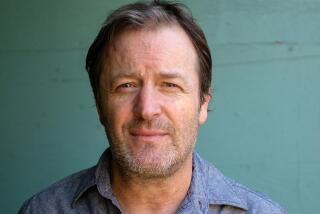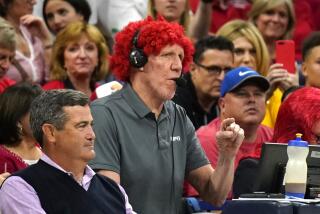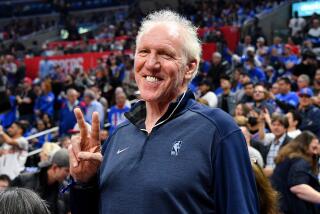A Gracious Man, but Driven to Win
- Share via
We were sitting in Wilt’s hotel room in Phoenix in the spring of 1973, watching an old movie and having one of our typical “disputations,” as he liked to call them. He’d just won $2 from me, betting that I couldn’t name the 10 largest cities in the country--in order; now I was trying to recoup, challenging him to name the 20 cities in California with more than 100,000 population.
Wilt never saw a statistic he didn’t remember, and he delighted in challenging teammates and friends to spontaneous wagers. I’d been following him around for about six months so I could write his autobiography, and we’d developed an easy, bantering relationship. His size, his celebrity and his presence intimidated most people, turned them into sycophants, and I thought we got along well while I was researching the book--and became friends for the rest of his life--largely because I wasn’t afraid to challenge him.
But he was having trouble with my California population challenge. The Lakers were scheduled to play the Phoenix Suns that night, and by the time we left the hotel for the game, Wilt was still missing two of the 20 cities. He said he’d give me their names after the game. I knew he’d ask his teammates for help, but I acquiesced.
Midway through the first quarter, he turned toward my seat as he ran down the court and shouted “Torrance.” Not long after, he did the same thing: “Fresno.” Then: “That’s $2 more you owe me.”
It was quintessential Wilt. No matter what he did, he had to win. After his teams lost so often to Bill Russell’s Boston Celtics, many people called him a loser. They were wrong. He set scoring and rebounding records that still stand, and in the two seasons that he had the best coaches and teammates, his teams won NBA championships--and set records in the process. It bothered Wilt more than he would ever admit to be branded a loser, and perhaps that’s why he competed so ferociously in every arena and always wanted so desperately to win, insisted so fervently that he was right in any discussion, no matter how trivial.
“If I tell you a mouse can pull a house,” he’d invariably say after making a particularly outrageous claim, “don’t ask me no questions; just hook him up.”
Only once did I ever hear Wilt admit he was wrong. It was about a year ago. Over dinner at our house, he and our then-9-year-old son, Lucas, began sparring about baseball statistics. Lucas is also stat-obsessive, and soon he had backed Wilt into a corner with the question “Who had the highest single-season batting average of anyone in baseball history?”
Wilt made several guesses (all wrong), tried (subtly and unsuccessfully) to induce Lucas, my wife, Lucy, or me to give away the answer--and finally gave up. When Lucas told him “Hugh Duffy--.438,” Wilt started to protest, then grinned and said, “You got me.”
I laughed. And I thought back to another dinner at our house, around Christmas 1989, when Lucas was only 3 months old. I had never asked Wilt for an autograph or a photo or a free ticket or anything, for myself or anyone else. And, given how many people try to take advantage of relationships with celebrities, I thought that, too, contributed to our continuing friendship. Now I had a son. I wanted a picture of him and Wilt together. But I was determined not to ask.
I didn’t have to.
Shortly before he left, Wilt put his arm around me and said, “How about a picture of Lucas and me?”
Wilt was equally solicitous of the women in my life. Lucy is a knowledgeable and enthusiastic sports fan, but I warned her before her first dinner with Wilt, in 1986, “Don’t start off asking him anything about basketball. He prides himself on being able to talk about a lot of other things.”
Sure enough, we discussed race, politics, movies, journalism, medicine and various other subjects--and then got down to basketball. He was insightful and delightful, as always, and he was charming and attentive to Lucy throughout. But he was rude and sexist toward his own date, as he usually was. At one point, he left her with us to get the telephone number of an attractive woman at the next table.
To the best of my knowledge Wilt never had a romantic relationship with a woman that lasted longer than a few weeks. He kept friends forever. But he discarded women like used Kleenex--as he boasted, to his everlasting regret, about 20 years after the publication of “our” book, “WILT: Just Like Any Other 7-Foot Black Millionaire Who Lives Next Door.”
He made the boast--that he’d slept with 20,000 women--in another book, one I didn’t write. Unfortunately for Wilt, this book came out around the time Magic Johnson announced that he had HIV, the AIDS virus. Suddenly, Wilt’s sexual exploits--which had seemed “merely” sexist and exhibitionist in the telling--made him look like a fool courting death.
Did Wilt actually sleep with 20,000 women? I don’t know. We were friends, but not intimate best buddies.
He sure slept with a lot of them, though. I remember being with him and a childhood friend of his in a hotel room in Boston late one night while I was working on the book. A woman called. She wanted to come see him. He asked if she had a friend. She said she’d call back.
A few minutes later, another woman called. She, too, wanted to see him. He invited her to come at midnight. Then the first woman called back. She’d found a friend. Wilt invited both of them to come as well--at which point Wilt ushered his friend and me out of the room.
The next day--not for the first time--I asked Wilt why he’d never married. “You love to travel,” I said. “Wouldn’t you like to be sitting in Venice with a woman you love, and be able to say to her, ‘Gee, honey, remember the wonderful time we had in Paris last year’?”
He looked at me as if I’d suggested he marry Bill Russell.
“Why do I have to ask her?” he said. “I can remember what I did in Paris.”
I always thought Wilt didn’t marry because he didn’t want to be vulnerable to another human being. I thought his promiscuity had less to do with ego and conquest than fear of intimacy. And I thought--still think--that was a terrible shame. I saw him with my wife and my son and with his family and close friends, and I know he had a lot of love to give. As husband and father, I know how much love he missed receiving.
Now he’ll never know.
More to Read
Go beyond the scoreboard
Get the latest on L.A.'s teams in the daily Sports Report newsletter.
You may occasionally receive promotional content from the Los Angeles Times.










